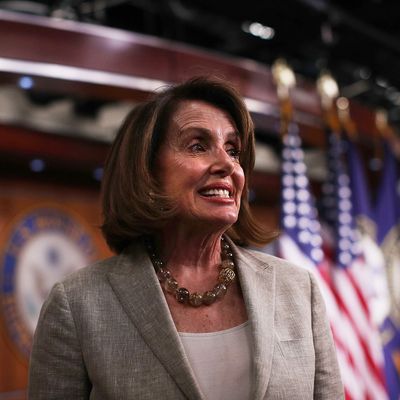
If voters give Democrats the House next year, Democrats will pass a $15 minimum wage out of the House within 100 hours of taking office, House Minority Leader Nancy Pelosi vowed on Thursday.
Pelosi’s pledge came as Democratic leaders introduced the legislation she promised to pass: Thirty-five Democrats in the Senate and 152 in the House signed their names to the Raise the Wage Act, a bill that would fully phase in a $15-an-hour rate by 2024, and guarantee that minimum to all workers, including tipped ones.
That a large majority of congressional Democrats — including Pelosi and Senate Minority Leader Chuck Schumer — would get behind such a bill is a testament to both the party’s leftward drift and the power of labor solidarity. Less than two years ago, the party’s leaders were pushing for a $10.50 wage floor. Last year, the Democratic front-runner insisted on $12.
Until very recently, the concept of doubling the current federal minimum wage was viewed with derisive disbelief — on both sides of the aisle. But then, in late 2012, fast-food workers began walking off their jobs. With the help of the Service Employees International Union, those workers built a movement that convinced three of America’s largest cities, two of its most populous states, and one of its major political parties to honor their core demand, in less than five years of organizing.
That’s a remarkable and encouraging feat, even if one is a liberal skeptic of the $15 rate. Organized labor has been the muscle behind nearly every progressive policy gain in American history. The fact that American workers can still radically expand the realm of the possible through solidarity — even as the union movement continues its bad decline — should be a source of comfort to progressives of all stripes.
That said, you don’t need to be a reactionary to question whether a $15 federal minimum is the best mechanism for securing all workers a living wage. Too often on the left, debates over this issue are framed in normative terms instead of empirical ones: Do workers deserve a minimum of $15 an hour for their labor? rather than Will a $15 minimum, in the context of our (profoundly unjust) capitalist economy, reduce employment or work hours for those at the bottom?
The answer to the first question is, in my view, of course. They deserve more than that. And if American wages had grown in line with productivity, they would have it.
But the second question is an open one.
Historically, minimum-wage increases have never brought about the kind of massive job losses that hyperventilating libertarians tend to predict. But there is some evidence that minimum-wage hikes in general — and a giant hike to $15, in particular — can have adverse effects for some so-called “low-skill” workers. And we know very little about how such a dramatic increase would impact less affluent rural economies, since the longest-running experiments with a (slowly phased-in) $15 rate have been in major cities with relatively high median wages.
This isn’t to say the Raise the Wage Bill necessarily sets the rate too high. For one thing, by 2024, that $15 minimum will be closer to $13 in today’s currency. For another, there’s reason to think a much higher minimum wage could have positive secondary effects that overwhelm any downside. Some studies suggest that a $15 hike would boost middle-class spending power, and thus economic growth and job creation. What’s more, if higher labor costs encourage employers to invest in automation, that might not be a bad thing — productivity growth is great, provided everyone gets a fair share of the product.
A $15 hourly wage is one way to try to ensure that everyone does. But there are others: California Democrat Ro Khanna has proposed boosting the Earned Income Tax Credit to provide as much as $6,000 a year for individuals and $12,000 for families — a proposal that amounts to $1 trillion transfer to America’s working people. (It’s also, essentially, a modest, universal basic income, with a work requirement.).
Another (less ambitious) way of promoting economic fairness would be to guarantee all workers’ access to the package of benefits that were once a cornerstone of the social contract between American employers and their (white, male) labor forces.
Virginia senator Mark Warner has introduced a bill that would lay the groundwork for such a guarantee. As Axios reports:
The bill from Virginia’s Warner, a Democrat, would give the Labor Department $20 million to fund pilot programs related to either new or existing models for portable benefits. In other words, benefits you that aren’t linked to employment status. Warner told Axios that “rather than starting with some kind of federally driven, top-down solution, what we’re trying to say is let’s go ahead and try and experiment.”
The grants aren’t supposed to go to a program that “provides only retirement-related benefits,” since Warner says he’s hoping there will ultimately be more types of benefits available to workers.
Warner is no one’s idea of a progressive Democrat. Which is part of what makes his proposal encouraging: Even Team Blue’s corporate wing is coming around to the premise that American workers deserve better, and the public sector needs to do something about that fact.
The Democratic Party’s populist drift is further reflected in the growing support on Capitol Hill for the signature policies of Bernie Sanders’s 2016 campaign — free public college for the working class and single-payer health care — and for the more progressive items in Hillary Clinton’s platform, like paid family leave and subsidized child care.
Put all of the aforementioned policies together and you have a pretty solid plan for making America great — or, much, much better than it’s been, anyway.
To be sure, the Democratic leadership is a ways away from endorsing a platform that would require such significant tax increases. Weeks before her $15 pledge, Pelosi vowed that her party would not make Medicare for all its official position on health-care policy anytime soon.
But Thursday’s announcement shows that the boundaries of the possible are expanding — and that elected Democrats are balancing their Trump denunciations and Russia investigations with efforts to give working people something to vote for.






























